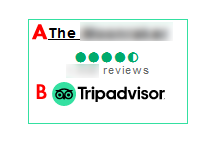Making sense of the reviews universe, how important are they really?
Word of mouth marketing (WOM), as told via customer reviews, photos, videos and other forms of User Generated Content (UGC) can have great value and help to make a compelling case for your hotel or business. The fact that UGC can be created with something as basic as an email address limits the degree to which you can you do anything significant if those people start writing lies.
This has provided an opportunity for commercial third-party reviews platforms to offer - especially hotels’ -their own solutions that claim to be better because they convince readers of the reviewer veracity – that they have been written by people that have experienced the product and so can therefore be trusted. In some cases, these 3rd party solutions integrate with a hotel’s booking engine to guarantee this layer of authenticity. Whether people reading the reviews appreciate this or not that depends on how well it is communicated to them, wherever these reviews are being read. Many people reading reviews are most likely very far down the conversion/sales funnel and so it is realistic to consider that they might simply looking for reassurance that they haven’t made a poor choice before purchasing.
In our first post on the reviews universe we are going to be contrasting what many businesses are being told, in terms of soliciting reviews from their customers, and contrasting this with a quantitative research study to simply sanity check the recommendations. We’re also going to take a peek under the bonnet of the Tripadvisor widget, installed on thousands of websites world-wide to see what we could find and raise some considerations, especially for hotels, about installing this and other third-party widgets on their property website.
Promise to write truthfully…pretty please?
In our experience we find that the “checks and balances” in place when submitting a review usually amount to ticking a check-box, where the reviewer has to confirm that they are telling the truth. How this stops companies employing people in countries to write reviews is a mystery to us, and how if the location of a computer can be hidden using a proxy server, can a reviews company put in place measures to detect untruthful submissions, is another mystery . It’s also not in the interests of the review platform to make the language too strong and dissuasive, otherwise the user might not submit a review at all!
I’m trying to work out whether reviews are helping my bottom line or not!
For the business owner trying to work out if the free reviews channel help or don’t help their bottom line, the closer you get to asking questions about their value, the opaquer and more veiled in secrecy the responses seem to get from the platforms. By contrast paid-solutions mean that you are invested for life in a platform subscription that is now the repository for all your customers review data. It’s not a great marketplace.
Is the mantra “Get as many reviews as possible” the only way?
One constant running through both the commercial and free solutions is the recommendation that you solicit reviews from your customers as much as possible – in the larger free solutions there seems to always be the suggestion that if you have lots of reviews, you will get greater visibility on any channels that are associated with the reviews tool. For example years back it was considered, and then tested by SEO circles, that having lots of reviews on Google would positively impact a business’s visibility, while Tripadvisor [link, last accessed 8/2/2022] says that Quality, Recency and Quantity are key factors in their Popularity Ranking.
The reviews universe, conclusions for business owners
Current review solutions still allow reviews to be posted largely unchecked, by people that could quite easily never had any contact at all with a business.
What can’t be ignored is this: people talking positively about your business, will enhance the perception of your business and result in more sales and conversion. The enigma is finding ways to measure it, especially if it is being paid, or assessing whether free reviews platforms are the way forward for your business or not.
In the travel space booking.com is one of the few Online Travel Agent’s (OTAs) that has its own review system where only those people that have stayed at a property are eligible to write a review. Many of the other Online Travel Agents simply reuse reviews data being published through channels where a User needs just an email to submit a review.
Presenting reviews consistently and the value of a traditional testimonials
If reviews are not being presented in a consistent and coherent way potential prospects will end up with a disjointed sequence of random voices and comments that simply don’t speak to them clearly. For businesses that already have a large number of reviews the ability to filter the reviews using specific keywords to isolate the relevance is a key tactic. For hotels the ability to show reviews for individual restaurant outlets, share the voice of the delegate that has attended a meeting or event function at the hotel, or of guests that have had amazing room experiences, makes it possible for a hotel to stand out and convert even more business.
If your website is available in different languages, the ability to show reviews in those languages, makes a much stronger case than reviews that have been automatically translated. These are some of the options available using our own reviews solution for business.
Reviews do provide an easy to administer friction less feedback mechanism, but it is also worth reaching out to key customers and asking them to provide a testimonial. The benefit of a testimonial is that you can ask people to respond to specific questions as part of the format, making the substance of the testimonial much more concrete, and also valuable for the people reading them. In our next post we’ll be covering what the research says about what are the key components to good reviews/testimonials that convert business.
3rd party review widgets that link out
Review platforms, such as Tripadvisor give businesses the ability to show review data in some form on their website. The widgets, that come in a variety of different formats, will show information that might include the total number of reviews, the name of the business, or even text snippets from the reviews themselves. In the case of Tripadvisor, nearly every widget we have seen will include their corporate logo.
Leaving aside the reasons why Tripadvisor recommends to businesses to add these widgets to their website, and because we at Internet Affected have a particular passion for the technical side of the Digital Marketing, we thought we would pop the bonnet on the widgets and do a mini-dive into the widget source code to see what we could find.
In the graphic above you can see an example of one of Tripadvisor’s “Your Reviews” widgets, we have added our labeling in red and also obscured the name of the Business widget for privacy purposes.
There are two web-links in this widget:
A Link to the reviews page of the business on Tripadvisor (Labelled A in the graphic).
A Link to the homepage of Tripadvisor (Labelled B in the picture).
In the middle of the graphic we’ve blurred the total number of reviews the business has received again for privacy.
When we inspect these linked elements with the Developer tools we noticed that the link A uses rel=”nofollow” while the Link B going to tripadvisor.co.uk does not (see the following graphic).
Inspection of Tripadvisor “Your Reviews” widget using Developer Tools.
According to the Google Search Console Developer Advanced SEO Guidelines we’re not sure why Tripadvisor is not applying a no-follow rule when they are linking to the their homepage (contained in the second pink circle above), but what we do know is that if Google were able to index these links, and they are getting better at doing this, we might expect that second link to be having a positive impact on Tripadvisor’s organic search rankings, where a highly relevant thematic link (in this case a hotel) counts positively towards Tripadvisors domain authority. If the Tripadvisor tech team want to reach out to clarify the reason for this we’ll happily update our post.
Zooming out from this technical section to summarize our considerations:
A person has arrived at your website (maybe via one of your own paid-for marketing campaigns).
They click on a reviews widget that can potentially take them to the homepage of another website, where your business no longer features prominently, if at all.
This person doesn’t understand why, gets lost, doesn’t find your business and abandons, or gets shown a rate or an offer from a competitor channel or business.
You risk ending up either losing the business, or having the prospect sold back to you less the commission from the channel provider (for hotels via an OTA).
As a business owner you don’t get a way to measure how many people are clicking these widgets and therefore taking away business from your website.
AND ALL THIS HAPPENS TO A PERSON THAT STARTED OUT ON YOUR WEBSITE!
Therefore, for us it makes no sense at all for a hotel or any other business to be using these widgets unless there are some compelling commercial reasons to include them. Everyone knows where hotel reviews are, and if someone wants to read them let them do a Google search for it instead, or providing them with an exit point on your website.
The end of reviews websites?
The web is becoming an ever-decreasing place of diversity as more and more companies get folded into ever bigger companies. For hotels, as for other businesses, this may actually be good news. That’s because as the diversity pool decreases, OTAs and affiliates, that traditionally skim commissions off businesses are in direct competition with the businesses they represent. Your hotel or business is now able to compete directly with the affiliates in the same channels. What’s more, the larger tech companies (Google, Facebook etc) are very keen to rub shoulders with the brands and take out the middleman.
Ultimately, we see these third-party affiliates being reduced to a straightforward distribution and lead-generation partners for one of the larger tech companies: whether that is Google, Meta, Apple, Amazon or another, time will tell.
Raise the drawbridge on our data quick!
The impact of the changes in these market pushes and pulls mean that, in the case of hotels, OTAs and other affiliates are raising the drawbridges on the data they share outside of their website networks and are increasingly launching new business models (for example loyalty schemes) and approaches to try and cement new revenue streams because they know that their days are numbered. For reviews platforms we are now noting that the reviews – the core raisons d'être for the portals – are getting sidelined in the pages becoming more a conversion function on the page, rather than something that used to take the main slot in the page. The “buy now/ book now” buttons on these review pages seem to be the only thing getting bigger and bigger.
So far in this post we have been using our professional and technical expertise to frame the reviews universe, but let’s now dive into a piece of research that looked at the role of reviews on product conversion. Does the learned research add further shakes to the foundations?
Are more reviews always best?
Review platform providers do say that the more reviews they have the better it will be for your business. But might that statement be driven by some commercial interests at heart? On the basis of our technical analysis we have noted that there might be potential SEO benefits for review widgets to glean a link from the business to their website, when not declaring no-follow rules on external links. We wanted to see how true it might or might not be that getting as many reviews as possible was also key, and whether there had been any studies that had been able to measure scientifically the impact on conversion when reviews were present on a web-page.
The research study data-set was composed of 7.8M users over a period of 12 months for a total of 15.5M page views. It looked at the impact that reviews had on conversion rates and was able to quantitatively measure the number of reviews and quantity shown as a way to measure the impact that reviews were having on conversion rate.
The average conversion rate of a product can increase by as much as 270% as it accumulates reviews.
Products with a higher price will see more impact with reviews than lower priced products.
Higher priced products convert by as much as 380% more with reviews, compared to 180% for lower priced products.
Users won’t pay too much attention to reviews when there are lots of them, instead they will focus on the first few.
Final take-aways
Even though in the research study it was not documented where the User was in the purchasing journey (i.e. TOFU/BOFU – top of funnel / bottom of funnel User), and therefore we can’t infer whether the reviews were tipping a customer that was about to purchase (BOFU) over the purchasing line, or convincing a customer that was cold and visiting for the first time (TOFU) and converting, what the study does show is that reviews are critically important for increasing the conversion rates and sales wherever they are placed, with some caveats (see next paragraph).
Relevancy is another a big takeaway where we see that higher priced products with reviews have more than twice the conversion rate increase, when compared to products with reviews that had a lower price point. Therefore, ensuring the reviews are product specific is an essential conversion weapon for winning more business online.
Review quantity – responding to the mantra of being told to get as many reviews as possible - was seen as not as important, as the conversion uplift (value-added) of reviews diminished after 5 or more. This will be an uncomfortable statistic for review platform providers, but it does mean that unless you are submitting reviews to hold on to a visibility being promised by review platform providers, it is quite possible to positively affect your sales conversion rate by selecting a small number of highly relevant reviews and placing them strategically across your web-pages
That concludes the first part of our deep-dive into UGC and WOM marketing methods to increase your website sales and conversions.
In the final part we’re going to be looking at what the research says about truly valuable reviews, and what they need to cover in order to drive the highest conversion rates.
If you like this post, do share it with your networks, and if you don’t want to miss when we publish part two, you can join our newsletter (below) or our free marketing club.
About the Author
Glyn Spencer Hopkins is the owner of Internet Affected and has been working exclusively with hotels for over a decade.
Internet Affected provides web marketing services tailored to the individual personalities of hotels; a complete range of digital services designed to help them take back ownership of their hotel brand from the OTAs. Specialized marketing solutions to increase guest loyalty, food & beverage bookings, events and wedding inquiries, clearly reported in straightforward language.













